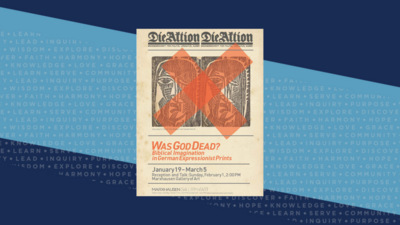What Can You Do with a Journalism & PR Major?

Think, for a moment, about the last news story you saw. What was it about? Where did you find it? How did you come across it? Whether it was a print article, a short clip on television or an Internet column, chances are that you can thank someone with a background in journalism for providing you with access to that information in a timely, organized manner. Journalism is a fast-paced, exciting discipline that focuses on analyzing the impact of events in real-time, writing and reporting on these events and spreading accurate information throughout a population.
With a major in journalism & public relations from Concordia University, Nebraska, you can find your place in the world of news and reporting. Whether your strengths are oral communication, investigation, visual design and layout or clear, concise writing, there’s a career in journalism and public relations waiting for you.
At Concordia, you can explore your interests in the field of journalism as early as your freshman year. Students who are interested in effective writing and communication can write or edit for the Sower student newspaper, join the speech & debate team, attend conferences held by the Northern Plains Collegiate Media Association (NPCMA), and more. Exposure to these opportunities can help students determine where in the field of journalism and public relations they may fit.
Most careers in journalism only require students to hold a bachelor’s degree; however, many companies favor applicants with undergraduate experience, such as a part-time job or internship in journalism, writing for a student newspaper or helping to produce a radio or TV broadcast. After graduation, students may be able to find work as a newspaper editor, marketing specialist, news reporter or analyst or a freelance writer. Salaries exist across a wide range, depending on job location, work type, and even the company for which one works. Generally, bachelor-level careers in journalism offer between $40,000 and $70,000 annually.
Students whose interests lie in writing, editing, reporting, communication and even marketing can find work that will suit their skills within the realm of journalism. Digital news and online media offer even more opportunities for journalism majors, especially those who take classes in marketing, graphic design, or computer science. The visual aspects of journalism require skilled photographers, designers and videographers to exist – reporting in 2024 involves much more than creating printed newspapers!
For students who wish to pursue further education after their bachelor’s degree, career options expand further, especially into the realm of management and supervision of journalistic teams. Earning a master’s degree in journalism is a prerequisite for working as a director of public relations, a senior correspondent – someone who reports from the scene of action, often remotely from abroad – or an executive editor. Earning a Ph.D. in journalism is also possible and opens opportunities for students to pursue work in research or academia.
Journalism is an exciting, variable field. Newsworthy events never stop occurring and can happen at all times of day. They take place across the globe and require prompt attention from reporters and writers trained in the discipline of newswriting. Therefore, journalists are rarely bored. Of course, the other side of this means that journalists may work odd hours, be required to travel for work and face some level of job stress. However, many journalists love this type of work – so don’t discount the possibility that it could be a great fit for you!
Overall, if you’re passionate about disseminating accurate information about pertinent events to local, nationwide, or even global populations, then a career in journalism and public relations may be right for you. The journalism & PR major at Concordia University, Nebraska is the perfect first step toward the career of your dreams.
Interested in Concordia’s journalism program? Learn more on the main webpage for the journalism & PR major.
Related Stories


